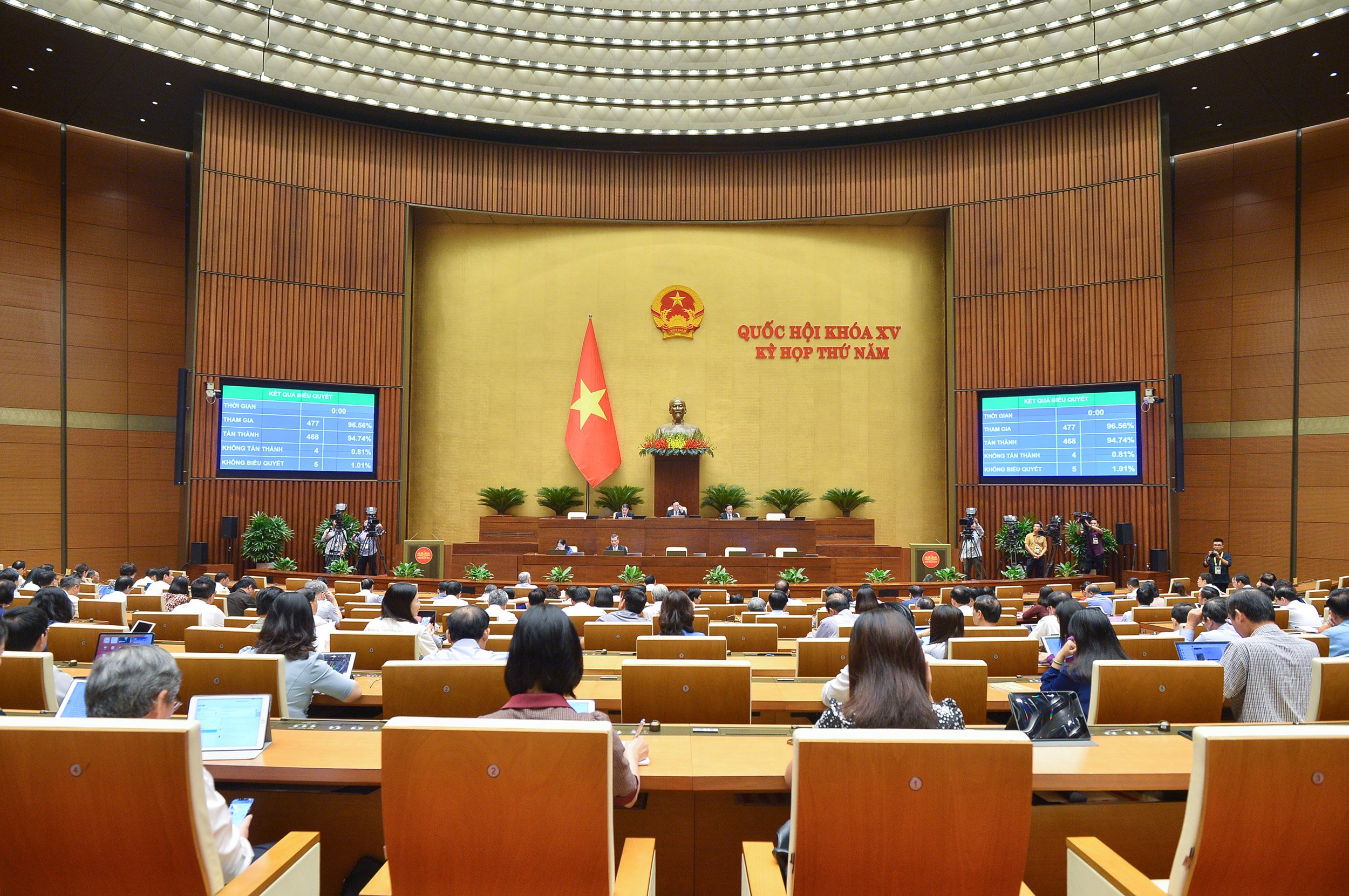On the morning of June 22nd, continuing the program of the 5th session, with 468 out of 477 participating delegates voting in favor (94.74%), the National Assembly passed the Law on Electronic Transactions (amended), consisting of 7 chapters and 54 articles, with several new points compared to the current law.
Accordingly, the Law on Electronic Transactions (amended) stipulates the acts that are strictly prohibited in electronic transactions, specifically:
Exploiting electronic transactions to infringe upon national interests, national security, social order and safety, public interests, and the legitimate rights and interests of agencies, organizations, and individuals;
Unlawfully obstructing or preventing the creation, sending, receiving, or storage of data messages, or engaging in other acts aimed at disrupting information systems used for electronic transactions;
Collecting, providing, using, disclosing, displaying, distributing, or trading data messages unlawfully;
Deleting, destroying, falsifying, copying, altering, or illegally moving part or all of a data message; creating a data message to carry out illegal acts;
Fraud, forgery, misappropriation, or unlawful use of electronic transaction accounts, electronic certificates, electronic signature certificates, or electronic signatures; obstructing the selection and execution of electronic transactions; and other acts strictly prohibited by law.

Members of the National Assembly participate in voting on the Law on Electronic Transactions (amended).
Before voting to pass the Law on Electronic Transactions (amended), the National Assembly heard reports explaining, receiving feedback, and revising the draft law.
Accordingly, in terms of scope, the Law only regulates the conduct of transactions by electronic means, and does not regulate the content, form, or conditions of transactions in various fields, including defense and security. Transactions in any field will be governed by the specialized laws of that field.
Regarding the State's responsibility for managing electronic transactions , the Law on Electronic Transactions (amended) stipulates that the Ministry of Information and Communications is the focal agency responsible to the Government for leading and coordinating with other Ministries and ministerial-level agencies in the State management of electronic transactions. Ministries, ministerial-level agencies, and People's Committees of provinces and centrally-administered cities shall coordinate with the Ministry of Information and Communications in the State management of electronic transactions within their assigned areas and responsibilities.
The Minister of National Defence exercises state management over electronic transactions in the field of cryptography and specialized digital signatures for official use, based on national technical standards and regulations on digital signatures as prescribed by law.
Regarding the legal validity of data messages, the scope of the Law only regulates the conduct of transactions by electronic means, and does not regulate the content, conditions, or methods of the transactions.
To ensure consistency with the scope of regulation, the provisions on notarization, authentication, consular legalization, and electronic archiving in Articles 9, 13, and 19 of the draft Law are merely references without specific regulations to avoid overlap and duplication within the legal system.
Therefore, the Standing Committee of the National Assembly retained this content as in the draft Law and did not add transitional provisions related to notarization and authentication in Article 53.

468 out of 477 delegates participating in the vote approved.
Regarding electronic signatures, there have been suggestions to add other types of electronic signatures besides digital signatures that meet the necessary conditions to ensure the security and legal validity of signatures.
Regarding this matter, the Standing Committee of the National Assembly stated that, according to Clause 11, Article 3 of the draft Law, an electronic signature is used to verify the signatory and confirm that signatory's acceptance of the information in the signed data message. It must be created in the form of electronic data logically attached to or combined with the data message to be considered an electronic signature.
Currently, other forms of electronic authentication such as scanned signatures, image signatures, one-time passwords (OTP), SMS messages, etc., are not considered electronic signatures.
However, to align with the practical implementation of operations in the banking, customs, and other sectors, and to promote electronic transactions, Clause 4 of Article 22 of the draft Law stipulates that the use of these confirmation methods shall be carried out in accordance with relevant legal regulations.
Regarding the conclusion and execution of electronic contracts, there is a suggestion to specify more detailed regulations on the storage and verification of data message integrity services to avoid duplication of functions and responsibilities between the Ministry of Information and Communications and the Ministry of Justice and provincial People's Committees (regarding authentication).
According to the Standing Committee of the National Assembly, the service of storing and verifying the integrity of data messages stipulated in Clause 1, Article 32 is the assurance that information created, sent, received, and stored cannot be modified or deleted in the electronic environment.
Meanwhile, current laws on authentication and notarization regulate activities such as authenticating copies from originals; authenticating signatures in documents; authenticating contracts; and notarizing and certifying the authenticity and legality of contracts in a real-world setting.
Therefore, these two types of services are different, and the regulations in the draft Law regarding the functions and tasks of the Ministry of Information and Communications related to this matter will not overlap with the functions and tasks of the Ministry of Justice and provincial People's Committees regarding authentication activities.
The Law on Electronic Transactions (amended) was passed by the National Assembly at its 5th session and came into effect on July 1, 2024 .
Source




![[Image] Close-up of the newly discovered "sacred road" at My Son Sanctuary](/_next/image?url=https%3A%2F%2Fvphoto.vietnam.vn%2Fthumb%2F1200x675%2Fvietnam%2Fresource%2FIMAGE%2F2025%2F12%2F13%2F1765587881240_ndo_br_ms5-jpg.webp&w=3840&q=75)

















































































































Comment (0)